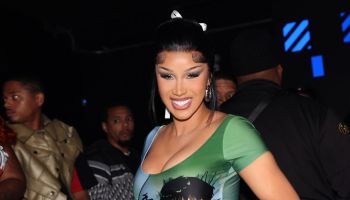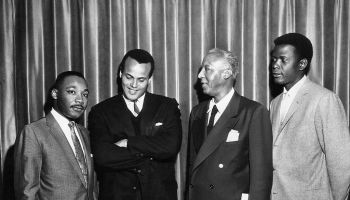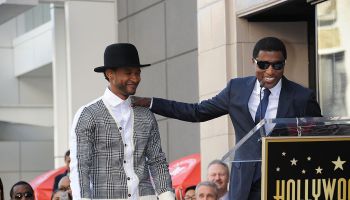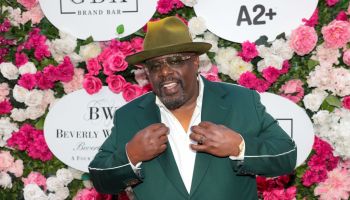Kanye West is not a genius. Geniuses solve problems, Kanye creates them.
Gary Barlow, a talented singer and showman pushing 40, is a star in Britain and the 2012 Olympic Games host nation’s Comeback King.
Scruffy looking in a black sequined blazer, a crisp white shirt and a sly grin framed by a 10 o’clock shadow, he’s Simon Cowell’s replacement on the hit UK show X-Factor and is also the cover star of this month’s Esquire UK.
But Barlow isn’t the reason why I picked up a copy of the stylish gentleman’s magazine: the six page article on the decline of hip-hop by writer and TV presenter Ekow Eshun was.
STORY: Kanye Goes On Epic 5 Hour Rant
Eshun is, I believe, the target of Kanye’s five hour EPIC Twitter rant last night.
A quick glance of the above image, which serves as an illustration of Eshun’s article and the decline of the planet conquering genre at-large, clearly targets Kanye as one of the reasons why uber-successful rappers are out of touch with the common and unemployed man.
Dive into the article’s text and the same conclusion is drawn. Get ready: liberal quoting ahead.
“As it crests to middle age, hip-hop is facing a crisis of direction that threatens its future as a meaningful cultural form,” Eshun writes. “The closest parallel to the current state of affairs is probably the sclerotic condition of rock in the Seventies. If there’s a symbol for rap’s current sense of drift, its probably Jay-Z and Kayne West’s 2011 album Watch The Throne. Recorded at exotic locations around the world, including Honolulu, Sydney and the Le Meurice hotel in Paris, the album is jarringly out of sync with the times.
From the high-end watch brands name-checked in its songs (Audemars Piguet, Franck Muller, Richard Mille) to the gaudy gold cover art by Givenchy’s creative director Riccardo Tisci, it is hard to believe that the album was made during the worst financial crisis since the Great Depression. That’s all the more alarming because hip-hop is all about context. At their best, rap artists demonstrate an acute awareness of place and purpose and history. That’s what makes, say Nas’ Illmatic (1994) with its deftly wrought portraits of life in the housing projects, so compelling to listen to.
Needless to say, that’s something Jay-Z excelled at on his landmark 1996 debut album, Reasonable Doubt and later albums. But for the most part, Watch The Throne is the document of a gilded super-rich lifestyle. And, stripped of reference to the lives of its listener-some of whom will be among the one in 10 Americans currently without a job-its relentless materialism risks sounding aloof and contemptuous.”
[pagebreak]
Continuing with this line of discourse, Eshun, above, states in the follow-up paragraph:
“True, some may empathise with Jay-Z’s horological dilemma in “Otis”-‘New Watch alert Hublots/Or the big face Rollie I got two of those.’ But it’s just as likely that many will agree with one critic’s tart assessment of it as “two famous” wealthy rappers celebrating their good fortune in the face of massive global inequality.”
Further on, Eshun details how both Jay-Z and Kanye’s lot in life has improved since becoming super-rich rappers: “For Kanye, it’s brought the means to hang out wih supermodels and fashion designers and buy seven-figure Japanese pop art.” Ouch.
Kanye’s response via Twitter last night:
Twelve hours later media and Kanye followers are trying to deconstruct the rapper’s tweets. If you read the Esquire article and put two and two together, the picture is clear.
Kanye’s tweets included references to education, entrepreneurship, the economy and his mom – all, I believe, in reference to Eshun’s portrait of Kanye.
Eshun updated his own Twitter page with a tweet this morning:
Not that it matters, but Eshun is Afro-British. He’s probably never met Kanye, though he might have since Kanye just bought a house in London where Eshun lives.
In his bio on the contributor’s page of Esquire, the award winning author and former director of the International Center For Contemporary Art writes, “I’ve been listening to hip-hop all my life, so this piece felt quite personal. I honestly don’t think I’d be who I am today without its influence. Although whether that’s a good or bad thing, I’m not sure.”
I think it’s a good thing and I agree with Eshun’s assessment that as a genre approaching middle age, commercial hip-hop has left the common man behind, whether or not the watches and jewels being discussed are real.
Kanye and Jay-Z have lost touch with the realities of real people, visits to Occupy Wall Street notwithstanding. Reading Kanye’s tweets, it’s crystal clear that Eshun article touched a nerve. Otherwise, why rant now?
On the whole, Eshun’s article isn’t an indictment of Kanye, one of hip-hop’s most visible rappers. The article is a concise assessment of an aging genre and a big-up to new jacks like Tyler, the Creator, Odd Future, Frank Ocean, Das Racists and underground rappers who, on the surface, reject the trappings of commercial success.
This thoroughly enjoyable read ends with Tyler, the Creator scratching his head, pondering why an unamed hip-hop star would buy a $60,000 chain.
“The money seemed a lot to him and, turning over,” Eshun writes. “He framed a question that sums up as well as any other the approach that-for now- he and his peers have to material reward: ‘You know how many fuckin’ tree houses you can make with $60,000 f*ckin’ dollars?”
















